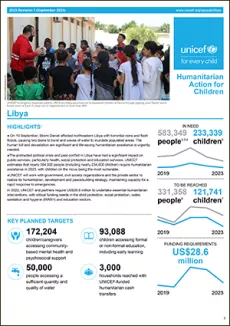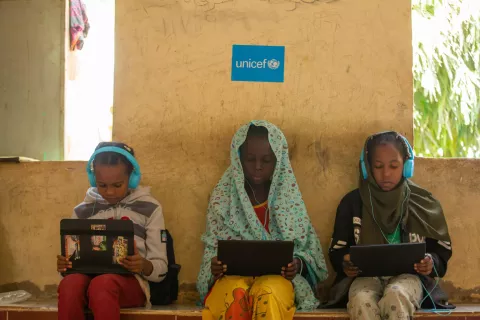Libya Appeal
Humanitarian Action for Children
UNICEF’s Humanitarian Action for Children appeal helps support the agency’s work as it provides conflict- and disaster-affected children with access to water, sanitation, nutrition, education, health and protection services. Return to main appeal page.
Libya snapshot
Appeal highlights
- On 10 September, Storm Daniel affected northeastern Libya with torrential rains and flash floods, causing two dams to burst and waves of water to inundate populated areas. The human toll and devastation are significant and life-saving humanitarian assistance is urgently needed.
- The protracted political crisis and past conflict in Libya have had a significant impact on public services, particularly health, social protection and education services. UNICEF estimates that nearly 584,000 people (including nearly 234,000 children) require humanitarian assistance in 2023, with children on the move being the most vulnerable.
- UNICEF will work with government, civil society organizations and the private sector to realize its humanitarian, development and peacebuilding strategy, maintaining capacity for a rapid response to emergencies.
- In 2023, UNICEF and partners require US$28.6 million to undertake essential humanitarian interventions, with critical funding needs in the child protection, social protection, water, sanitation and hygiene (WASH) and education sectors..

Key planned results for 2023
172,204 children/caregivers accessing community-based mental health and psychosocial support
93,088 children accessing formal or non-formal education, including early learning
50,000 people accessing a sufficient quantity and quality of water
3,000 households reached with UNICEF-funded humanitarian cash transfers
Funding requirements for 2023
Country needs and strategy
 Humanitarian needs
Humanitarian needs
While the 2020 peace process and the 2021 formation of the Libyan National Unity Government brought a wave of optimism, Libya remains ensnared by an intricate web of challenges, from its fragile security environment to an unpredictable political landscape. This volatile mix increases the risk of violence, further complicated by external factors such as the war in Ukraine, which, by driving up food prices, adds to the country's complexity. Libya's ongoing humanitarian crisis is a manifestation of various factors: continued armed conflict, political fragmentation, economic adversities, and the repercussions of climate change. A clear indication of the economic decline is that, after a decade of turmoil, Libya's estimated gross domestic product per capita in 2021 was approximately half of what it was in 2010.
UNICEF’s estimates that 584,000 individuals, including close to 234,000 children, are in need of humanitarian assistance. The gravest situations are faced by those who have been forcibly displaced, individuals with disabilities or chronic diseases, households led by women, and those whose resilience has been eroded due to extended displacement. Delving deeper into these figures, it emerges that nearly 247,400 people are deprived of essential water, sanitation, and hygiene facilities. Over 175,800 children are in immediate danger and require protection, and around 111,400 children are on the brink of losing access to educational opportunities if humanitarian aid is not extended.
Despite its internal turmoil, Libya remains a key migration route, serving both as a destination and a transit point for Europe-bound asylum-seekers and migrants. Currently, the country shelters approximately 705,746 migrants and refugees, of which nearly 78,000 are children. Furthermore, Libya has a significant number of internally displaced persons, estimated at 160,000. Cities such as Benghazi, Misrata, Tripoli and Sirt bear the brunt, hosting the largest migrant and refugee populations. Given the lack of stringent border controls, migrants, particularly women and children, are vulnerable to a gamut of threats, including those posed by smuggling rings and other illicit activities. This makes them one of the most vulnerable groups in Libya, with many facing severe detention conditions, family separations, and other challenges.
The recent catastrophe of Storm Daniel on 10 September further exacerbated Libya's predicament. Northeastern regions of the country experienced intense rains and flash floods, with Derna, Shahat, and Al-Bayada bearing the brunt of the devastation. The storm's aftermath was dire, resulting in significant human casualties and infrastructure damage.
 UNICEF’s strategy
UNICEF’s strategy
In Libya, UNICEF is committed to providing immediate life-saving support, especially to individuals affected by Storm Daniel, internally displaced persons, refugees, migrants, with an emphasis on women and children. UNICEF's humanitarian approach aligns with national objectives from the Country Programme Document and the United Nations Sustainable Development Cooperation Framework. Upholding the Core Commitments for Children in Humanitarian Action and the Humanitarian-Development-Peace Nexus, UNICEF aims to strengthen resilience, reduce vulnerabilities, and assist Libya through its humanitarian transition. This approach ensures all children, irrespective of nationality or residence status, have access to crucial aid.
UNICEF values a localized humanitarian response, fostering partnerships with local stakeholders and enhancing their ability to offer balanced, high-quality, gender-informed assistance. Collaborations span governmental bodies, NGOs, private sectors, and active community involvement, especially the youth. By leading the water, sanitation, and hygiene (WASH) and education sectors, and supporting the nutrition group, UNICEF plays a pivotal role in inter-agency coordination. Collaborating with UN agencies and distributing urgent supplies through the Rapid Response Mechanism, especially in hard-to-access areas, with pre-positioned emergency assistance is crucial for timely responses.
UNICEF champions access to reliable water services and advanced sanitation facilities, encompassing schools, healthcare establishments, and detention centers. Beyond immediate health and nutritional aid, UNICEF bolsters healthcare systems and personnel, centering on the unique needs of children, newborns, and mothers. This readies the national health system for potential health challenges. Community centers' operations, child protection, and educational services remain a UNICEF priority, with an emphasis on integrated health and education interventions targeting vulnerable groups and host communities.
In light of Storm Daniel, UNICEF has been proactively addressing immediate needs in Eastern Libya from the start of the crisis, engaging in assessment missions in collaboration with government crisis cells, the UN, and NGOs. UNICEF is prioritizing WASH, Health, and Child Protection, which includes the distribution of vital emergency relief supplies, providing immediate technical support to government institutes involved in emergency response and expansion of humanitarian partnerships with implementing partners to provide direct child-centered support to affected population.
Programme targets
Find out more about UNICEF's work
Highlights
Humanitarian Action is at the core of UNICEF’s mandate to realize the rights of every child. This edition of Humanitarian Action for Children – UNICEF’s annual humanitarian fundraising appeal – describes the ongoing crises affecting children in Libya; the strategies that we are using to respond to these situations; and the donor support that is essential in this response.





